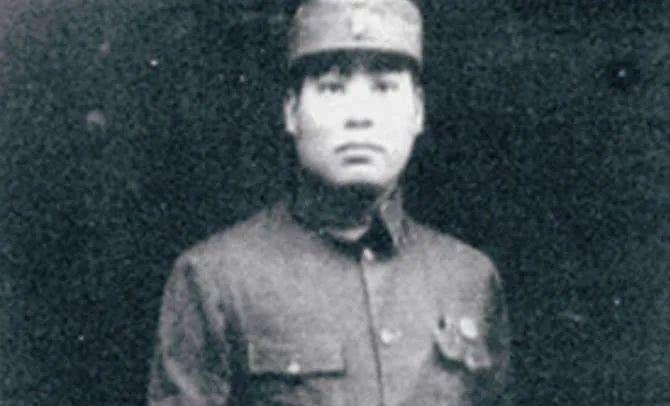This text is about 1228 words
Reading required
3 min
In June 1941, at the gate of the Japanese Taizhou barracks, a pregnant woman with a pregnant belly was shouting, which alarmed the Japanese commander in the barracks at the time, Nanfang Xiangji. This Chinese woman dared to shout loudly at the door of the Japanese military barracks, and what was she shouting?
The story begins with the pregnant woman's husband.
The pregnant woman's name was Wang Zhifang, and her husband was Chen Zhongzhu, then the commander of the 4th Column of the Guerrilla General Headquarters of the Lusu-Anhui Border Region of the National Revolutionary Army.

Chen Zhongzhu was born in 1906 to a peasant family in Yandong Village, Caoyankou Township, Jianhu County.
In the Northern Expedition of the National Revolutionary Army in 1927, he participated in the preparation of the Kuomintang grass-roots party branches and peasant association organizations, preparing to fight against the local local tyrants and inferior gentry. Soon after, Chiang Kai-shek launched the April 12 counter-revolutionary incident, and Chen Zhongzhu fled Nanjing to study at the Jiangsu Provincial Police Academy.
In 1937, after the "July 7" Lugou Bridge Incident and the outbreak of the National War of Resistance Against Japanese Aggression, he was full of enthusiasm for resisting Japan and saving the country, actively participated in the Anti-Japanese Salvation Movement, organized railway employees, students and the masses along jinpu Road, established a field service regiment, and was appointed as the commander of the third general corps of the field special regiment of the Military Commission of the National Government. He fought in the famous Battle of Taierzhuang and the Battle of Xuzhou.
At the end of 1938, Chen Zhongzhu was hired by the General Guerrilla Command of the Lusu-Anhui Border Region as the commander of the Fourth Column major general, leading more than 2,000 troops to garrison the vicinity of Xuzhou.
In early June 1941, the Japanese puppet army "swept up" in several ways, encircling and suppressing the troops of the Lusuwan Guerrilla General Headquarters who insisted on resisting Japan, mainly targeting the Fourth Column commanded by Chen Zhongzhu. Due to the fierceness of the enemy, Commander-in-Chief Li Mingyang failed to inform Chen Zhongzhu of the enemy situation in time, causing the Fourth Column to be suddenly attacked, retreating while fighting, and the casualties of the troops became more and more numerous, and finally they were forced to retreat to the area of the Bengfei River, and they were moved in small wooden boats, and the puppet army fought for several days on the same day.
One day, more than a dozen enemy motorboats came from the direction of Xinghua Laoge, and Wu Jiaze's enemies were stuck in the way of advance, and Chen Zhongzhu immediately decided to let his wife Wang Zhifang and his six-year-old daughter yang Fenggao lead the transfer, and he took the guards to block the enemy. Because he was tall, holding a telescope, rushing ahead, he was found by the Japanese puppet army of Wu Jiaze, and a shuttle machine gun swept over, and he was killed by six bullets.
When the enemy cleaned up the battlefield, he found his body, cut off his head and took him to Taizhou to ask for a reward from the Japanese commander Nanfang Xiangji. His headless body was buried in a coffin nailed by the local people with a door panel and inserted with a wooden plaque that read "General Chen Zhongzhu".
Chen Zhongzhu's wife, Wang Zhifang, heard the bad news, resolutely stood up pregnant, and went alone into the Japanese military camp in Taizhou to ask Xiangji in the south for her husband's head.
Nanfang Xiangji was shocked to learn of Wang Zhifang's intentions, and deeply respected this strong and resolute woman, and also greatly admired Chen Zhongzhu's heroic spirit of sacrificing his life for the country.
Nanfang Xiangji said: "We are two countries, Commander Chen is his country, and I am for my country." But we admire his bravery and his spirit. Therefore, Nanfang Xiangji returned the head of Major General Chen Zhongzhu to Wang Zhifang.
Wang Zhifang took away her husband's head in grief and buried it with her body.
After the victory of the War of Resistance Against Japanese Aggression, the Nationalist Government also held a memorial service for Chen Zhongzhu in Nanjing, which was attended by Yu Youren, Wu Tiecheng, Chen Guofu, and others.
The Republic has not forgotten this warrior who sacrificed his life for the country, and in February 1987, the People's Government of Jiangsu Province posthumously recognized Chen Zhongzhu as a revolutionary martyr.
When Mrs. Wang Zhifang, Mrs. Chen, who is living in Australia, learned of this news, she couldn't help but burst into tears: "Retreat (Chen Zhongzhu, the word retreat), retreat, you can blind your eyes..."
*Graphic source network, copyright belongs to the original author.